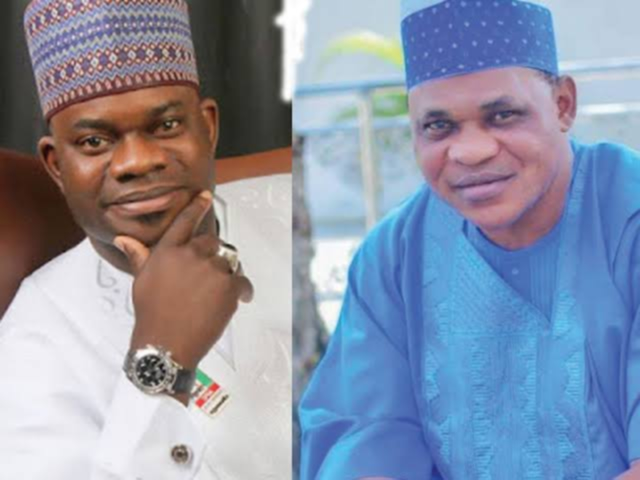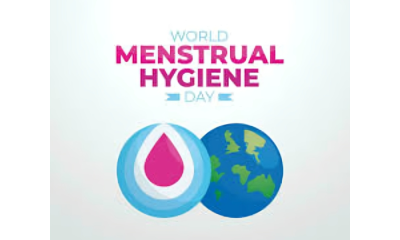OPINION
Kogi 2019 Election: Gov. Bello and Engr. Wada at tipping point

By Menyanga Abu
Politics under normal circumstance does not intrude on everyday lives of its practitioners but when the lives or interests of the politicians are bumped up against the political world, it can most often be intimidating.
Every human being, so did Aristotle said, is a political animal. Going by this anyone who wants to predict the future should be able to have hands or be part of its creation. Let me point out here that one of the numerous penalties or consequences of refusing to participate in politics is that one or the society may end up being governed by the inferiors, or even fools. As such it is important that any person who wants things done and done well in any democratic dispensation needs to learn the game of politics. The political field of an individual consists of the dynamic interactions of leaders who are seeking to use and increase their powers so as to advance and achieve their agendas and to equally protect and satisfy their self-interest. The political force field of an individual tends to fluctuate constantly as power is sometimes gained or lost, agendas succeeded or failed and self-interest is fulfilled or frustrated. Whatever the situation, a good politician should be able to act altruistically in the concert of governance or political maneuvering with the expectation that those around him will do the same.It is a fact that the genuine world falls short of ideal situation, that on its own should not however prevent good politicians from adopting such a method that will help them to successfully navigate through the human minefield without resorting to killing and the use of unemployed youths as thugs.Gov. Bello, without visibly executed projects and performance in Kogi state apart from his romance with the kogi traditional leaders and the federal government is able to understand or do I say misunderstand the psychological dynamics of power brokers and influencers in Igala land. He believes that an average Igala man is easily motivated by “what is in it for me” and not “what is in it for the Igalas”. Bello has been able to build an informal psychological dossier on politically-non-assertive and ravenous Igalas that are in his political force field just by giving them stipends. The greatest power and weapon in politics is the ability to get along with others and influence their actions through subtle diplomacy and conviction but not by the use of thugs to scare the opponents, voters and supporters of other political parties. The Igalas should file behind Eng. Musa, steering together a common course if they don’t want to suffer the fate of the ancient mariner.
Eng. Wada and governor Bello are at the tipping point in their campaigns and political trade. This is the point in time that the political activities in kogi state have reached the decision level that important issues such as the performances of Bello’s three and half years of governance have to be critically analyzed, x-rayed and put to debate as to whether he should be voted out or not. This is the point at which issues and ideas cross a certain threshold and gain significant momentum triggered by some minor or major factors or changes. This is a critical point in an evolving situation that will lead to new and irreversible developmental changes in kogi state. All odds seem to be against Bello, from non-payment of salaries for upward of 38 months, lack of visible projects to romance with the traditional leaders. No doubt Bello has carried out one or two federal projects in the state, one of which is leading the kogi traditional rulers who claimed to have endorsed him and presenting him to federal government in Abuja – a new dimension in politicking. The situation in kogi needs to change but not with Bello at the helm of affairs. The state has reached that point that with Bello’s style of governance it will never get out of this despondent state of affairs unless there is paradigm shift, which I believe is not likely with Bello. Kogi state has gotten to the critical point in an evolving political state of affairs that will eventually lead to a new and irreversible development. Kogites especially the kogi east should not feel intimidated by threats or gull with filthy offers and stipends by governor Bello. People should not be scared from voting, come out en mass and vote for the candidates of your choice; they cannot kill everybody. Kogites should be ready to pay Bello in his own coins for the pains and anguish he inflicted on them in the last three to four years.The swing senatorial district in the state is East.
The votes from Kogi East are the determining factor because of the population and high number of registered voters. Although the people who cast vote in this part of the world don’t decide the outcome of the election but those that count the votes decide everything. The Igalas need to put their house in order, come out with block vote and massively cast their vote for Eng. Musa except they are satisfied with the position of a deputy governor with their population and the development or none of it so far witnessed in the state. Kogi west is watching and waiting to know the direction that the Igalas will take. In most cases those who vote and elect corrupt politicians, thieves, non-performers and traitors are not at all the victims of the consequences but accomplices. I don’t want to see Igalas as cheap people who pride in their number that means nothing to them in this governorship election as some of them are said to have been bought allegedly.
The governorship election in Kogi state is a referendum of supremacy between APC and PDP, Igalas and Ebiras, the poor masses and the rich politicians in and outside the state who are bent on fostering Bello on the suffering Kogites despite his poor performance. What are the campaign points that Bello will use to appeal to the conscience of Kogites to vote him for the second tenure? I have in my wild imagination tried to figure out those little achievements, if any. May be to the Kogi East he is going to tell them that he has given them the position of a deputy governor which I believe they won’t accept because they on their own and kogi West can equally produce a governor. He may likewise tell the Kogi East that he has done well by buying Rolls car for the Attah of Igala; that too is not an achievement as it is part of social or shared responsibility of any governor in any state of the federation. He may tell Kogi Central that he is their own and though he has failed woefully he needs to be there to protect their “political interests”. And to Kogi West and the rest Kogites he may wish to tender apologies for his dismal performance with promises to do well in his second tenure. As I mentioned earlier, one of the federal projects embarked upon by Bello was leading kogi traditional rulers who have endorsed him to Mr President, maybe for some of them to just see the president whom they have never met physically. I don’t know whether we should call this one an achievement or mal-achievement; the demolition of the round-about in Lokoja town. In the first few days of Bello‘s administration he embarked on the pulling down of most of the round-about in the state capital calling them” Igala shrines”, may be looking for Igala amulets, what an insult? The thought then was that he was going to build befitting edifice for the state capital but what do we have today, sites of the shattered round-about without hope of erecting new ones. One painful aspect of Kogi issues is the external forces working against the development of the state. Let me ask this simple and intriguing question, could Tinubu have tolerated Bello as a governor of Lagos state? Were Ambode’s sins up to half of Bello’s mal-administration? Yet Ambode was removed for “non-performance” while doing everything beyond comprehension to retain the non-performing Bello. A governor that failed to pay salaries for workers for upward of 38 months is adjudged to have performed well by the same Tinubu. We are not even talking of infrastructural development which is zero; just workers salaries, this man could not pay for almost well three solid years, yet Tinubu and Oshiomhole are busy telling kogites that this man Bello has performed wonderfully well. Is this Tinubu’s vision for Nigeria that he is aspiring to lead come 2023? If so Nigeria as country is a goner. What is happening in various state of the country today is a microcosm of the goings-on in Nigeria. It is unfortunate that our so called leaders are not ready to admit and face the hard facts. Tinubu, is this your apparition for Nigeria or you just want to be president for the sake of it? You should have been the first person as APC’s national leader to tell other party leaders and the NWC the implications of fostering a non performing governor on the people of kogi state.
APC is all about Buhari, the president has been going from one country to another to woo investors to the country, yet some of you, his followers, seem not to be on the same page with this man. My advice to Mr President is, don’t give up, one day people will come to value what you are doing. The developed countries are watching Nigeria state by state. They know the states that are serious-minded in terms of development, if we like let’s continue to politicise the issues of development and feeding ourselves with blatant lies that Bello has performed well but the facts are there for whoever care to know. What we need in Kogi is a free and fair election, and for goodness sake let the votes of Kogites count on November 16. Enough of the so-called federal might and their plans to install Bello by all means and at all costs.
OPINION
This Trial of Oloyede
By Tunde Akanni
It’s been traumatic for my entire family since that video started making the rounds. I sneaked a slight view… It’s our trial. It’s my trial. Oloyede is genuine. He is most sincere. He is modestly so, as well. For us, however, Allah knows best.
I was with a trader in the afternoon of what I considered a dark Wednesday, the 14th of May. “Se bi won ni JAMB o get mo bayi…”. I had to cut in immediately. Which JAMB? “Madam, that’s one person I will vouch, and vouch for…zero tolerance for corruption. Absolutely responsible with a high level of consciousness for the good of others. If certain things went wrong at JAMB, I agree it’s his responsibility to carry all pleasant and other burdens but just know that the bad side of the operations may as well be sabotage. I have absolute trust in that man. Ask my own colleagues about me, but Oloyede is my own hero, somebody I have known for more than 40 years…”This is by no means a reductionist disposition to the tragedy induced by the so-called computer glitch. May the Almighty God in His infinite mercy console the parents of the candidate reported to have committed suicide. May God strengthen them to survive this gloomy phase of their lives and sustain them to reap bountiful compensation that will endure in their lives. It’s hard, so hard to pull tragedies of this magnitude. I personally feel for these parents.The said computer glitch, may we never fall victim to it. Those who work for big organisations requiring a large layout of ICT operations know what I’m talking about. Rather than being ‘solutional’, IT facilities can be unimaginably problematic sometimes, yet indispensable in this civilisational dispensation. This is not doubting deliberate sabotage, as may have happened in the case of JAMB. I’ve been part of Oloyede’s JAMB journey to attest to his commitment to offer his best for the otherwise sinking board.Far from being cosmetically exhibitionist, the Oloyede-led JAMB team, led by the Education minister, Tunji Alausa, went round the critical facilities of JAMB during the just concluded examination. Alausa saw, firsthand, like never before elsewhere in this country, how far JAMB had gone in its strive for transparency and the real-time monitoring of the conduct of examinations nationwide. Alausa, beyond being in awe, sought to make the JAMB effect spread immediately to other examination bodies.No be dem say, same day, the WAEC team came to JAMB and made it into the situation room, which was my own duty post. The NECO team followed suit afterwards, both duly led around by the sturdy lead IT consultant who’s been reliably there from Oloyede’s assumption of duty, Damilola Bamiro. Far richer, given that they charge more for their exams, the duo of WAEC and NECO were suddenly mandated to understudy the examination sector leader in Africa that JAMB has become over time.The staff of both WAEC and NECO suddenly had to undertake a professional excursion led through all the real time monitoring screens and other digital facilities. It was obvious they marvelled at what they saw, revealing a functional leader-subordinate synergy manifest with trendy output that the world can see and learn from.But that may even seem like the tip of the iceberg of the output of the hard work and commitment of the nation’s foremost icon of integrity in public service. A series of far more seemingly serious strides had been accomplished by Oloyede at JAMB. As a focused scholar, he keeps ensuring that every bit of the experience of the Board is treasured as worthy data to guide future actions and even subjects for further research.Not even the agencies dedicated to emergency matters in Nigeria could have been as prompt as the Oloyede management on this ugly glitch saga. Once the complainants began ventilating into the public space, JAMB rose to the challenge without any predictably traditional arrogant stance of government is always right. I was aware that a particularly strident public critic and a former students’ leader at Obafemi Awolowo University, Adeola Soetan commended the spokesperson for JAMB for the excellent handling of public complaints.Promptly, an independent team of investigators was set up to unravel the mystery leading to the rather depressing situation that now confronts us. The team, drawn from assorted but technically relevant constituencies, has found out that no fewer than 165 centres of over 800 examination centres nationwide were affected.Obviously well prepared for whatever the outcome may turn out to be, he braced up to the challenge to embrace the surrender value to tell it to the world as it is. This trial is for all of us who believe and trust Oloyede. I am in this group. So much so that his public cry infected me…It was a patriot’s cry for his beloved country. Like me, a former Law don at LASU, Dr Kilani wasn’t any less affected as demonstrated in a quick note to me: “I write to associate myself with the pain, sorrow and emotion of our own Professor Oloyede. I could not hold my tears seeing him cry. May Almighty Allah see him through. May we all not be put to shame…”But then came a soothing message from Gbade Osunsoko, my cousin: “…He will come out of this much stronger because Nigerians will trust him far better than a number of our leaders.. A man that makes mistakes happens under him and takes responsibility – it’s a big deal in Nigeria.”With Oloyede, young Nigerians with challenges regarding sight are no longer left to moan their fate endlessly, with adequate provision for their inclusion in the UTME. How many of our public facilities are this inclusion conscious as stipulated by SDGs? How come a legacy built through almost a decade at the very best cost ever possible will be made to crumble when the game changer leader remains ever modest? JAMB has steadily risen through thick and thin to accomplish its tasks to the admiration of stakeholders, nationally and internationally, under Oloyede. Both NNPC and the Nigeria Police, being beneficiaries, can attest to the current competence of JAMB. How many other numerous stakeholders nationwide never deemed to have any relevance to JAMB before Oloyede but have since become critical, if not indispensable players?But why does this sudden saddening encounter threaten our joy of service without blemish? Why this unforeseen truncation of a good story, so intentional, coming from Africa? Whodunnit? Surely the truth shall come out for the world to perceive and assess and get to appreciate the efforts and the quantum of commitment appropriated to the JAMB excellence project driven by Oloyede.One cannot but be deeply concerned. Before the very eyes of a few of us carefully selected to give support from our respective professional perspectives from the very beginning, Professor Oloyede’s concern for genuine growth and development was real. It is still real and increasingly so, as a matter of fact. Indeed, inimitable. It shall be well.Tunde Akanni is a professor of Journalism and Development Communications at the Lagos State University, LASU. Follow him on X:@AkintundeAkanniOPINION
Democracy, Institutions, and the Rule of Law

By Kator Ifyalem
Democracy, often hailed as the cornerstone of modern governance, is a system that empowers citizens to participate in the decision-making processes that shape their lives. However, the mere existence of elections is not enough to ensure a fair, just, and prosperous society.
Without robust institutions, the rule of law, and ingrained values, democracy can become a hollow shell, susceptible to corruption, manipulation, and eventual collapse. At its core, democracy is built on the principle that power resides with the people. This power is exercised through fair elections, where citizens choose representatives to govern on their behalf. The effectiveness of this system relies heavily on the strength of supporting institutions, adherence to the rule of law, and shared values that guide societal behaviour.Institutions serve as the backbone of a democratic society, translating the will of the people into action. These include governmental bodies such as the legislature, executive, and judiciary, as well as independent organizations like electoral commissions, anti-corruption agencies, and human rights commissions. These institutions provide checks and balances, ensuring that no single entity or individual can accumulate too much power. They create a framework for accountability, transparency, and effective governance.An independent judiciary is crucial for upholding the constitution and protecting individual rights. Without it, laws can be manipulated or ignored by those in power, leading to tyranny. Similarly, a free and independent media acts as a watchdog, informing citizens and holding those in power accountable. When media institutions are weakened or controlled by vested interests, the flow of information is compromised, and citizens are unable to make informed decisions.The rule of law is another critical component of a functioning democracy. It ensures that all citizens, regardless of their status or position, are subject to the same laws and legal processes. This principle is fundamental to creating a fair and just society where everyone’s rights are protected. A robust legal framework, consistently and fairly enforced, provides the predictability and security necessary for social and economic development. It protects property rights, enforces contracts, and creates an environment conducive to investment and growth.Moreover, the rule of law is essential for protecting minority rights and preventing the tyranny of the majority. In a true democracy, the rights of all citizens must be respected, even if they are not part of the ruling majority. This protection is enshrined in laws and enforced through effective legal institutions.Values form the third pillar of an effective democracy. These shared beliefs and principles guide societal behaviour and inform policy-making. Democratic values include respect for human rights, tolerance of diversity, commitment to justice, and belief in the equality of all citizens. When these values are deeply ingrained, they act as a safeguard against authoritarian tendencies and help preserve the integrity of democratic institutions.For instance, a healthy democracy can be likened to a three-legged stool, where institutions, the rule of law, and democratic values form the legs. Just as a stool cannot stand stably without all three legs being strong and balanced, a democracy cannot function effectively if any of these elements is weak or missing. In Nigeria’s case, we’ve seen how weaknesses in one area, such as institutional challenges in election management, can put stress on the other legs, requiring the judiciary (rule of law) and civil society (democratic values) to bear more weight to maintain stability.Education plays a crucial role in instilling these values. A well-informed citizenry, aware of their rights and responsibilities, is better equipped to participate meaningfully in the democratic process. Civic education programs that teach the principles of democracy, the importance of institutions, and the value of the rule of law are essential for creating engaged and responsible citizens.The interplay between institutions, the rule of law, and values creates a self-reinforcing cycle that strengthens democracy. However, this cycle can also work in reverse. Weak institutions often lead to a breakdown in the rule of law, eroding democratic values and further weakening the system. This negative spiral will ultimately lead to the collapse of governance, even if the outward trappings of democracy remain.To prevent this decline, concerted effort is required on multiple fronts. Institutional capacity must be built and maintained through adequate funding, training, and support. The rule of law must be consistently enforced, with mechanisms in place to address corruption and abuse of power. This requires not only strong legal frameworks but also a commitment to their implementation.International cooperation also plays a role in strengthening democracy. Countries learn from each other’s experiences, share best practices, and provide support for development. However, it’s crucial to recognize that democracy cannot be imposed from outside; it must be nurtured from within.True democracy requires more than just the act of voting; it demands a comprehensive system of governance that respects the rights of all citizens, upholds justice, and promotes the common good. Strengthening these fundamental pillars (institutions, the rule of law, and values), is crucial in building more resilient, effective, and truly representative democracies that serve the needs of all citizens and contribute to global stability and prosperity. Where does Nigeria as a nation stand on this scale?OPINION
Reshaping Nigeria’s Student Loans for Inclusive Access

By Tosin Kolade
In June 2023, President Bola Tinubu signed the Student Loan (Access to Higher Education) Act into law, marking an important step forward in the country’s approach to financing tertiary education.The initiative was designed to provide interest-free loans to students in higher institutions, thereby expanding access to education for financially disadvantaged youth.
However, nearly two years on, the scheme’s implementation remains burdened by challenges, prompting growing concern and debate among stakeholders. In response to criticism of the original law, the Federal Government repealed and re-enacted the Act in April 2024.The revised legislation established the Nigerian Education Loan Fund (NELFUND) as a corporate entity responsible for managing and disbursing the loans.Notably, the amended version eliminated restrictive eligibility criteria such as income thresholds and guarantor requirements.It also extended the scheme’s coverage to include students enrolled in government-accredited vocational training centres.To streamline access, the application process was simplified, requiring only a valid National Identification Number (NIN) and Bank Verification Number (BVN).Hence, all submissions were made via the NELFUND portal.In spite of these improvements, the scheme has continued to attract criticism.One of its most vocal opponents is the Academic Staff Union of Universities (ASUU).In a recent interview with a national daily, Dr Mwolwus Jurbe, Chairman of ASUU’s University of Jos chapter, outlined the initiative as “fundamentally flawed”.He argued that the scheme was unlikely to benefit its target groups, especially students from low-income families.“The scheme is pushing education out of the reach of the common man,” he said.Jurbe said that, amid high unemployment rates and soaring tuition fees, expecting repayments from indigent students was unrealistic.ASUU also raised alarms over reports that TETFund allocations might be redirected to fund NELFUND.The body warned that dismantling a functional funding mechanism in favour of an untested alternative could jeopardise the future of tertiary education in Nigeria.Meanwhile, the National Association of Nigerian Students (NANS), while generally supportive, has also expressed reservations.The association acknowledged the potential of the scheme to reduce dropout rates, but emphasised that the absence of scholarships or grants rendered it incomplete.NANS President, Comrade Olushola Ladoja, condemned the alleged mismanagement of NELFUND, calling for the dismissal of implicated officials and the publication of the 51 tertiary institutions reportedly involved.“Any vice-chancellor, rector or provost found culpable in the mismanagement of student loans must be removed from office.“Their actions sabotage the Federal Government’s effort to make education accessible to all,’’ Ladoja said.He urged Tinubu to probe the reported diversion of N71.2 billion and criticised NELFUND for excluding the national student leadership from key stakeholder engagements.Additionally, NANS called on the EFCC and ICPC to investigate the matter and advocated for a five-year post-NYSC loan repayment grace period, citing the employment difficulties faced by many recent graduates.Civil society groups have also raised concerns.The Education Rights Campaign (ERC) described the initiative as “badly thought-out, ill-conceived and fundamentally unworkable”.Hassan Soweto, National Coordinator of the ERC, lamented repeated delays in the loan rollout, calling it evidence of poor planning and political inertia.“It is a national embarrassment that almost a year after the law was signed, students are still waiting for funds,” he said.Worthy on note, trust in the scheme further eroded in August 2024 when it was revealed that no tertiary institution in the South-East had been included in the first phase of disbursements.Reacting, the Concerned Igbo Stakeholders Forum (CISF), led by Chukwuma Okenwa, condemned the omission as a deliberate act of marginalisation.Okenwa argued that excluding an entire geopolitical zone from a national programme violated the federal character principle.Although NELFUND claimed South-East schools had failed to respond to verification notices, the CISF rejected this explanation, insisting that at least one compliant institution should have been selected.Similarly, the Corporate Accountability and Public Participation Africa (CAPPA) expressed concern over NELFUND’s plan to limit eligibility to students in “high-demand” disciplines.Zikora Ibeh, CAPPA’s Senior Programme Manager, warned that the policy could marginalise students in the humanities, arts, and social sciences.“This approach risks deepening inequality by denying support to students whose fields may not be seen as immediately profitable but are crucial to national development,” she said.Also, controversy followed the announcement that the EFCC had donated N50 billion in recovered funds to the loan scheme.A Legal expert, Nnaemeka Ejiofor, cautioned that while well-intentioned, the EFCC lacked constitutional authority to reallocate recovered public funds without National Assembly approval.“Such actions, no matter how well-meaning, set a dangerous precedent,” he warned.Meanwhile, fee hikes across federal and state universities have exacerbated the financial burden on students and their families.In some cases, tuition fees have surged by as much as 1,000 per cent.A University of Lagos student, Michelle Njemanze, shared that her tuition rose from N16,000 to N196,000 in a single academic session.For many, the student loan scheme remains a promise yet to be fulfilled.Although the Tinubu administration allocated N200 billion to the scheme in the 2024 budget and appointed banking executive Jim Ovia as chairman of the NELFUND board, disbursement delays continued well into May 2025.In response to growing dissatisfaction, NELFUND recently announced a major overhaul of its application system.NELFUND Chief Executive Officer, Mr Akintunde Sawyerr, recently revealed that the agency was deploying a fully digitised, user-friendly platform to streamline the loan process and eliminate bureaucratic delays.“Education is a right, not a privilege; with this technology-driven model, we are establishing a transparent and efficient system that puts students first,” he said.Sawyerr added that the reforms aligned with Tinubu’s Renewed Hope Agenda, which prioritised educational access and youth empowerment.According to him, more than 320,000 students had already benefited from the scheme, with thousands more undergoing verification as operations scale-up.Looking ahead, NELFUND also plans to integrate its systems with institutional portals across the country.This collaboration aims to enable seamless data exchange, automate student record verification, and speed up loan processing.While recent reforms are encouraging, experts insist that sustained political will, transparency, and inclusive policies are essential to realise the full potential of Nigeria’s student loan scheme.They agree that, in theory, the loan scheme offers a vital opportunity to democratise access to higher education in Nigeria.In practice, however, its rollout has been hindered by legal ambiguities, implementation delays, and regional inequities.If these challenges remain unresolved, experts warn, the scheme may end up widening the very educational gap it was intended to close. (NAN)































